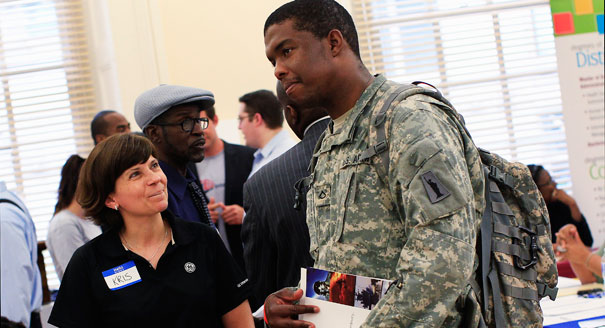President Obama’s State of the Union address brought with it so much to chew on. It was his mention of withdrawing 34,000 U.S. troops from Afghanistan within the year that caught our attention. We began thinking about the challenges vets often face in returning home. Already there are issues for veterans trying to find employment. CBS reports that in 2010, the veteran unemployment rate was 20.6 percent, while civilians’ unemployment rate averaged 12.3 percent.

(Photo Credit: Iowa National Guard)
As civilians, we will never truly understand what our veterans experienced overseas. But on their return, we must welcome them warmly and help them leave the hardship behind. This does not mean pretending they haven’t been affected by the traumas they encountered; this means listening to them, loving them and assisting with their transition back into the work force. As the wars in Iraq and Afghanistan wind down, The White House estimates that one million military members will enter the civilian workforce in the next five years. We’ve put together tips so that the American workforce can truly welcome back its heroes with an emotionally intelligent and professional approach.
Tips for employers concerning veterans:
- If you absolutely must turn away a veteran, suggest organizations like the VFW and the Iraq and Afghanistan Veterans of America (IAVA). These are great resources that offer employee placement assistance.
- Networking, finding direction and resume writing are crucial to the job hunt. If you know a veteran struggling to find work, send them our way for coaching. We are happy to help with career planning.
- A common concern discussed surrounding hiring veterans is lack of tailored skills for company needs. Consider a mentoring program. If that sounds like an overwhelming financial obligation, consider the recent tax incentives to hire veterans. The tax credit may make mentoring possible, which would truly change that veteran’s future for the better.
- Utilize skills veterans have acquired. Service experience typically generates attention to detail, extreme discipline, quick thinking and many more valuable skills. Chances are your organization could really benefit from an employee with that skill set if you take time to figure out placement.
- Make it clear to the employee (veteran) that they are important to the company’s success. Their skills are vital and their presence is appreciated.
- If you already employee a veteran, be honest, calm and patient during their transition into their new position. Make the workplace veteran friendly by participating in veteran appreciation and coordinating mentorship.

(Photo Credit: Politico)
Here are a few organizations and job websites dedicated for veterans. If you have a job, you can list it here:
Furthermore if you have questions regarding application and interview do’s and don’ts, visit the EEOC website.
Let’s make welcoming home our veterans a positive experience for everyone.
Roger, and out!





